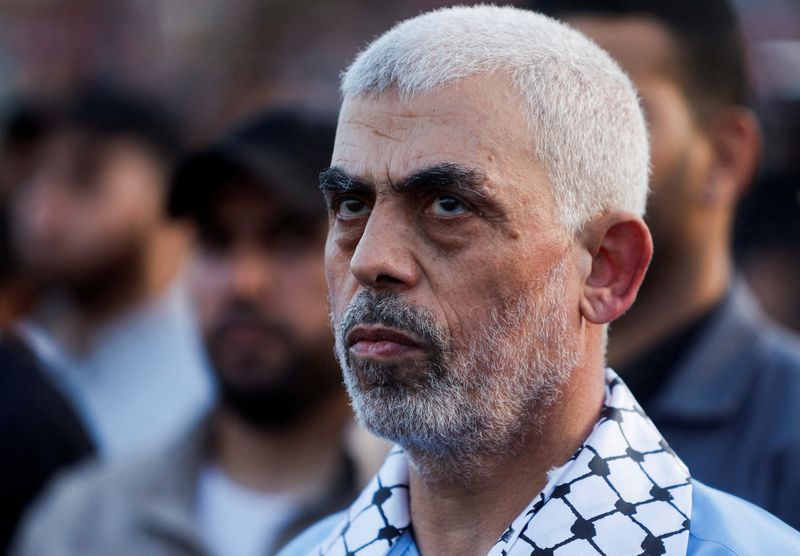By James Mackenzie, Nidal al-Mughrabi and Samia Nakhoul
JERUSALEM/CAIRO (Reuters) – Lebanese militant group Hezbollah said on Friday it is moving to a new and escalating phase in its war against Israel, while Iran said “the spirit of resistance will be strengthened” after the killing of Hamas leader Yahya Sinwar.
Sinwar, the mastermind behind the Oct. 7, 2023, attack that sparked the war in Gaza, was killed on Wednesday during an operation by Israeli soldiers in the Palestinian enclave, a pivotal event in the years-long conflict.
Western leaders said his death offered an opportunity to end the conflict, but Israeli Prime Minister Benjamin Netanyahu said the war would continue until hostages seized by Hamas militants were returned.
“Today we took stock. Today evil has been dealt a blow, but our task is still not completed,” Netanyahu said in a recorded video statement after the death was confirmed Thursday.
“To the dear hostage families I say: this is an important moment in the war. We will continue with full force until all your loved ones, our loved ones, are home.”
Sinwar, who was named as Hamas's overall leader after the assassination of political leader Ismail Haniyeh in Tehran in July, is believed to have been hiding in the warren of tunnels that Hamas has built under Gaza over the past two decades.
He was killed Wednesday during a firefight in southern Gaza by Israeli forces who initially were unaware they had captured their country's biggest enemy, Israeli officials said.
The military released a drone video of what they said was Sinwar sitting on an armchair and covered in dust in a destroyed building.
Hamas itself has not commented, but sources within the group have said that evidence they have seen indicates that Sinwar was indeed killed by Israeli forces.
'MAIN OBSTACLE'
Despite Western hopes for a ceasefire, Sinwar's death could spark hostilities in the Middle East, where the prospect of an even bigger conflict has increased.
Israel has launched a ground campaign in Lebanon over the past month and is now planning a response to an October 1 rocket attack carried out by Hamas ally Iran and Lebanese Hezbollah.
But the death of the man who planned last year's attack, in which fighters in Israel killed 1,200 people and captured more than 250 hostages, could also help advance stalled efforts to end the war, according to Israeli figures. war in which Israel killed more than 250 people. According to Gaza health authorities, that number is 42,000 Palestinians.
US President Joe Biden, who spoke to Netanyahu by phone to congratulate him, said Sinwar's death provided an opportunity to finally end the conflict in Gaza and allow Israeli hostages to be brought home.
The US wants to initiate talks on a proposal to reach a ceasefire and secure the release of hostages, said US State Department spokesman Matthew Miller, calling Sinwar the “most important obstacle” to ending the war.
“That obstacle has clearly been removed. “I can't predict that that means whoever replaces (Sinwar) will agree to a ceasefire, but it does remove what has been the main obstacle to getting one in recent months,” he said. In recent weeks, Sinwar had refused to negotiate at all, Miller said.
Iran indicated there was no sign the killing would change its support. “The spirit of resistance will be strengthened” after Sinwar's death, his mission to the United Nations said.
Hezbollah was also defiant, announcing “the transition to a new and escalating phase in the confrontation with Israel.”
US Secretary of State Antony Blinken held separate phone calls with leaders in Saudi Arabia and Qatar on Thursday to end the conflict in the Middle East, the State Department said.
NO COMFORT, NO COMPROMISE
Families of Israeli hostages said that while Sinwar's killing was a significant achievement, it would not be completed while the hostages were still in Gaza.
Avi Marciano, the father of Noa Marciano, who was killed in captivity by Hamas, told Israeli broadcaster KAN that “the monster, the one who took her from me, who had the blood of all our daughters on his hands, finally reached the gate . of hell.”
“A little justice, but no comfort,” he said. “There will only be comfort when Naama, Liri, Agam, Daniela and Karina, our girls' friends, return home.”
In Khan Younis in the southern Gaza Strip, a displaced Palestinian named Thabet Amour told Reuters that the Palestinian fighting would continue.
“This is resistance that doesn't disappear when men disappear,” he said. “The killing of Sinwar will not lead to the end of the resistance, nor to a compromise or to surrender and raising the white flag.”
(Reporting by Laila Bassam and Timour Azhar in Beirut, Maayan Lubel and James Mackenzie in Jerusalem, Nidal al-Mughrabi and Ahmed Tolba in Cairo, Lena Masri, Elwely Elwelly in Dubai; Costas Pitas in Washington and Michelle Nichol in New York; Writing by Lincoln Feast; Editing by Stephen Coates)

